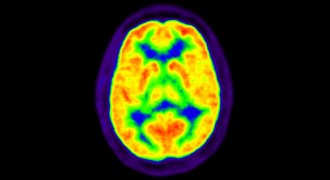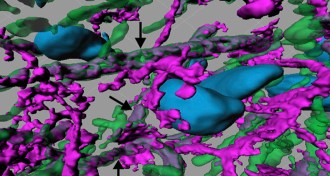Humans
Sign up for our newsletter
We summarize the week's scientific breakthroughs every Thursday.
-
 Psychology
PsychologyScientists of a feather flock together
When it comes to major scientific issues such as global warming and GMOs, scientists and the public don’t see eye to eye. It might be because socially, they don’t see each other at all.
-
 Health & Medicine
Health & MedicineU.S. measles tally for 2015 now at 121 cases
The 2014–2015 measles outbreak in the United States has now reached people in 17 states and the District of Columbia.
By Nathan Seppa -
 Health & Medicine
Health & MedicineGlowing amino acid lights up growing brain cancer
By adding a tracer compound that sticks to the amino acid glutamine, researchers may be able to discern and monitor cancerous tissues in the brain.
By Nathan Seppa -
 Psychology
PsychologyAdults with autism are left to navigate a jarring world
Researchers are beginning to study ways to help adults with autism navigate independently, get jobs and find friendship.
-
 Health & Medicine
Health & MedicineBouncing back from giving blood can take months
Taking iron supplements after donating blood can dramatically reduce the time it takes to recover iron levels in the blood, a study finds.
By Nathan Seppa -
 Health & Medicine
Health & MedicineFallout from nuclear bomb testing presaged today’s radioactive tracers
Scientists in 1965 measured buildup of radioactive carbon from nuclear bomb testing in people.
-
 Health & Medicine
Health & MedicineSigns of sleep debt found in the blood
When rats and people skimp on sleep, fats and acids involved in metabolism dwindle.
-
 Neuroscience
NeuroscienceShots of brain cells restore learning, memory in rats
Scientists healed damage caused to rats’ brains from radiation by injecting cells that replenish the insulation on neurons.
-
 Health & Medicine
Health & MedicineHandheld device turns smartphone into diagnostic tool
A compact device can process a blood sample to diagnose HIV or syphilis when attached to a smartphone.
By Nathan Seppa -
 Health & Medicine
Health & MedicineE-cigarettes lower immunity to flu and other germs
Electronic cigarettes produce substantial amounts of lung inflammation, a new mouse study finds. They may also reduce the ability to fight off infections from strep and flu germs.
By Janet Raloff -
 Humans
HumansBaby brains undergo dramatic changes in utero
Developing human brains experience more than 28,000 changes in a molecular process that governs gene activity.
-
 Anthropology
AnthropologyAncient Maya bookmakers get paged in Guatemala
New discoveries peg ritual specialists as force behind bark-paper tomes and wall murals.
By Bruce Bower